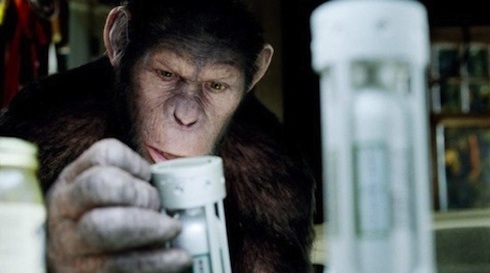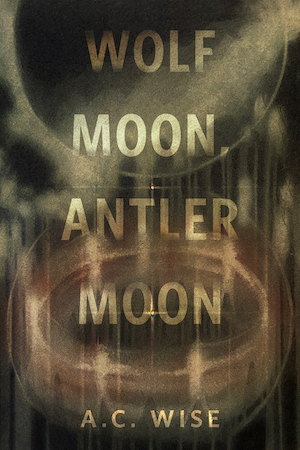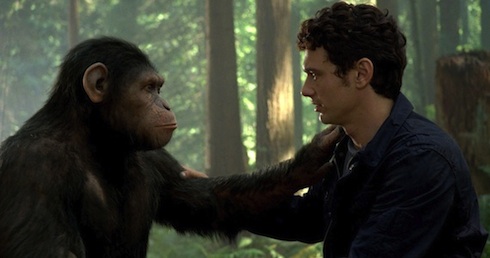If all the various summer movies were really happening, all of us would probably be in need of a serious nap. Between god hammers falling, magic rings, bulletproof shields, transforming robots, metal-bending mutants, and cowboys in a high-noon showdown with aliens, a lot of moviegoers likely have action movie fatigue. Luckily, Rise of the Planet of the Apes is not an action movie. And unlike a film like Green Lantern, Transformers, or the 2001 version of Planet of the Apes, this film has a lot of heart. And it’s mostly because everyone involved went back to the themes that made the old apes films such a beloved part of the culture.
Spoilers ahead.
Director Rupert Wyatt and screenwriters Amanda Silver and Rick Jaffa must have sat down and watched all the previous apes films and read the original Pierre Bouelle novel, because thematically they did all of these incarnations justice. And they also did it without trying to connect with any of the previous continuity. And though Abrams/Orci/Kutzman have been praised for this on the Trek reboot, this Apes reboot is in a totally different league than Trek or even the reimgained Battlestar Galactica insofar as it simply attempted to retain the important and resonant themes of the source material without trying to “ape” any of the rest of it.
With a reboot like Trek, all that was really accomplished was that the likeability of the fictional universe was made more mainstream. With BSG, the untapped potential of a good premise ruined by 70s campiness was turned into a socially relevant series. Rise of the Planet of the Apes is far more daring as a reboot than either of those, because save for having the lead ape being named Caesar (played here by Andy Serkis), nothing that happens in this movie deals with the universes in the novel or previous films. Instead, we’re given little motifs, which function as a beautiful tribute to what has come before. Caesar’s mother is known as “Bright Eyes” a reference to what Zira and Cornelius called Taylor in the original Apes film. The facility in which Caesar is imprisoned is an echo of the one Taylor was retained in, but also pays homage to the ape management horrors experienced by the original Caesar in Conquest of the Planet of the Apes.
Instead of just a reboot of the Apes series, Rise can been seen, from a certain angle, as a remake of Conquest, insofar as it depicts an origin story of how apes could come to take over the planet. But instead of the charmingly bonkers premise of a plague that wiped out all cats and dogs, this new film gives us something a little more elegant. The airborne virus strain that increases intelligence in apes has an adverse and deadly effects on humans. The reason for the existence of the virus strain is also perfectly unique and elegant as it comes from a desire by Will (James Franco) to do good in the world. The virus strain Will invents is designed to beat Alzheimer’s, which is ravaging Will’s father (John Lithgow). Essentially, if this character never had Alzheimer’s, Will’s motivation for accelerating the research on the cure wouldn’t have existed, and the apes would probably never have risen! What a wonderful origin story! But how does this relate to the more cynical message of the old films?

In the classic Apes series, our simian counterparts inherit the Earth because we’re too sloppy and blow it up with nukes. This new Apes seems to depict that a bio-medical pandemic will cause the human race to fall and the apes to assume a position of dominance. However, this isn’t too dissimilar to the themes of the old movies because the whole reason numerous apes are injected with the mind-expanding solution comes from the greed of the company Will works for. In a wonderful turn, Will realizes how dangerous everything is and how many mistakes he’s made in his super-unethical research. However, his superiors aren’t hearing it and rush to experiment on as many apes as possible. Just like the old films, overzealous human ambition leads to our downfall. This is countered well by the notion that Caesar (like the Caesar of old) has a specific code of ethics. He implores his ape followers not to kill the majority of the humans, and only uses deadly force when totally necessary.
This is a fantastic homage to what the classic films were all about, and even when Caesar turns a hose back on his human captors, you can almost picture Roddy McDowall back in the role. The trailers for Rise of the Planet of the Apes make it look like a two-hour long action epic of carnage and gorilla warfare. (Sorry a1ay! Couldn’t resist.) However, nothing could be further from the truth. This movie fits right in with the spirit and message of all the previous Apes films as it wonders, like Charlton Heston did at the start of the first film, “Is there something better than man?”
Now, with Caesar firmly in place, and a mysterious space mission possibly returning to the Earth, perhaps a sequel to Rise of the Planet of the Apes will explore the question of our humanity through these great apes even further.
Ryan Britt is a staff writer for Tor.com.










